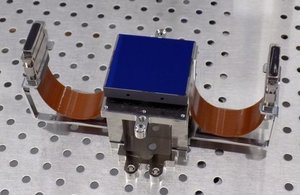UK company delivers first hardware for pioneering mission
A UK company has reached the landmark of delivering the first imaging components of a mission to investigate dark matter and dark energy.

Charge Coupled Device (CCD) imaging sensor. Credit: e2v.
Under ESA contract, e2v in Chelmsford, has developed a new Charge Coupled Device (CCD) imaging sensor for the space telescope and the first four have now been delivered to the Mullard Space Science Laboratory (MSSL), in Surrey. The remaining CCDs for the Visible imager (VIS), will be delivered over the coming months.
The UK Space Agency is funding MSSL to lead the European instrument consortium that is developing and building Euclid’s Visible imager, to be delivered to ESA. The mission, due for launch in 2020, should revolutionise cosmology by improving our understanding of the evolution of the very fabric of the Universe since its birth in the Big Bang, around 13.8 billion years ago.
During its 6 year mission, Euclid’s 36 CCDs will be bombarded with charged particles from the space radiation environment, causing damage. Supported by the UK Space Agency, the Open University’s Centre for Electronic Imaging is working with MSSL to simulate this environment and conduct experiments to understand the impact of charged particles on detector performance, so that radiation damage effects can be removed from the eventual science images.
The entire VIS instrument will generate 610 megapixel images – 25 times larger than a top-of-the-range digital camera and with much better image quality. The field of view of VIS is 0.78 degrees x 0.7 degrees – slightly larger than the area covered by a two full Moons – and the spacecraft will manoeuvre to conduct a survey over the course of the mission.
The second instrument on Euclid, the French-led Near-Infrared Spectrometer and Photometer (NISP), is also making progress, and its first detectors are expected to be delivered in the spring. Light gathered by Euclid’s 1.2 metre diameter primary mirror will be split and sent to the two instruments. Together they will map the 3D distribution of several billion galaxies spread over the entire extra-galactic sky.
This will enable scientists to determine in unprecedented detail the properties of the mysterious dark energy and dark matter which are thought to make up most of the Universe.
The UK Space Agency is also contributing to the development of the scientific data processing capability for Euclid, with UK involvement being led from Edinburgh’s Institute for Astronomy.